Before making a purchase, customers typically seek recommendations, a practice deeply rooted in the human inclination to trust the experiences of others. This phenomenon is precisely why testimonial advertising has become an essential business strategy. By showcasing authentic customer reviews and experiences, testimonial advertising builds trust and holds the potential to attract new customers.
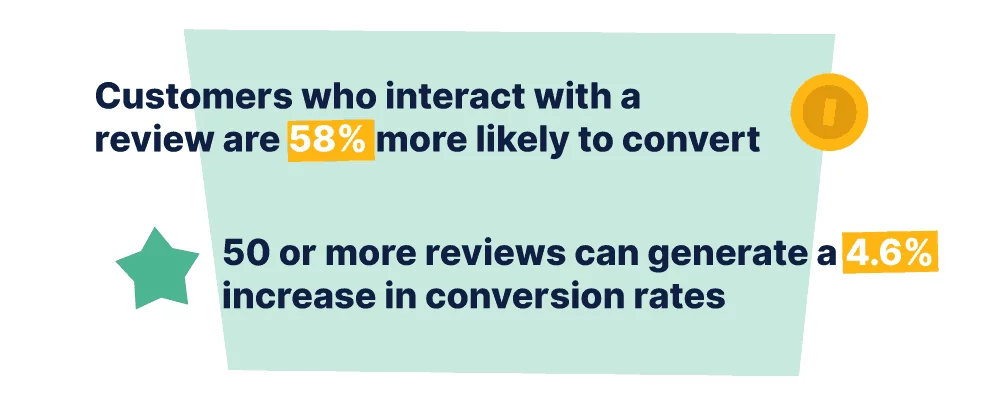
People inherently trust individuals more than they trust brands. This is evident in the overwhelming preference for customer testimonials over self-promotion by brands. According to Wyzowl, 9 out of 10 people express trust in the words of a customer over those of a brand. Moreover, a staggering 95% of individuals admit that reviews, both positive and negative, significantly influence their purchasing decisions.
This unmistakably underscores the importance of testimonials as a potent marketing and advertising tool.
Understanding Testimonial Advertising:
Testimonial advertising is a strategic approach that amplifies customer reviews and experiences across diverse marketing channels. By leveraging the authenticity inherent in these testimonials, businesses can spotlight the value of their brand, product, or service. This method goes beyond conventional advertising by establishing trust and persuading potential customers through real-life endorsements.
The hallmark of testimonial advertising lies in its ability to present the genuine voices of satisfied customers to a broader audience. This authenticity becomes a formidable asset for driving lead generation and boosting sales efforts.
Differentiating Testimonials from Endorsements
It’s crucial to distinguish between testimonials and endorsements. Testimonial advertising primarily relies on insights from everyday customers who willingly share their experiences. While some may provide feedback without expecting incentives, others might do so in exchange for a gift card or discount.
In contrast, endorsements often involve generously compensated celebrities to promote a brand’s products or services. Influencers, depending on their reach, can fall into either category. Those with a smaller following might be viewed as providing testimonials, while mega-influencers are often considered endorsers due to their significant reach and compensation.
Varieties of Testimonial Advertising:
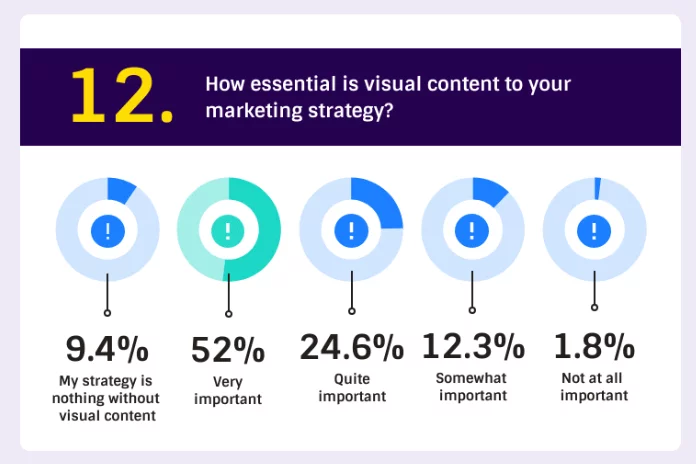
Testimonial advertising encompasses various forms tailored to meet diverse marketing needs:
- Text Testimonials: These are customer recommendations and may include Yelp reviews, customer quotes, or product page reviews.
- Image Testimonials: Utilizing visuals, these testimonials effectively convey customers’ satisfaction by sharing pictures showcasing positive experiences.
- Video Testimonials: Featuring the voices of satisfied customers, video testimonials are ideal for sharing on websites, YouTube, or social media platforms.
- User-Generated Content Testimonials: When customers voluntarily share their experiences with a brand, such as posting photos on social media, it constitutes user-generated content testimonials.
Learn about testimonial plugins here.
Real Life Cases of Testimonial Marketing:
1. Boxed Water — Harnessing User-Generated Content for Environmental Advocacy
Type: User-generated content
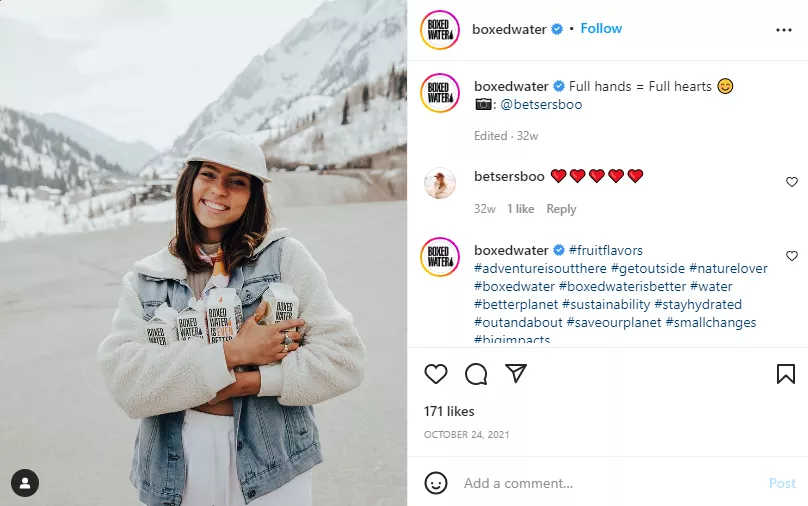
Boxed Water, an eco-conscious water company utilizing 92% plant-based, recyclable containers, effectively leverages user-generated content on Instagram. Displaying images of content customers holding their products, Boxed Water’s approach is not just about selling water; it’s about promoting an environmental ethos.
In a notable instance, a customer named Betsy participated in their #betterplanet campaign. The campaign pledged to plant two trees for every post with the hashtag. Betsy’s post went beyond a mere product showcase; she passionately detailed Boxed Water’s commitment to a sustainable planet. This strategy not only promotes the brand but also fosters a community of environmentally-conscious consumers.
Pro Tip: Implementing product review automation can streamline the process of gathering and showcasing customer testimonials, as demonstrated by Boxed Water.
2. Baking Steel — Elevating Credibility Through Media Mentions and Customer Reviews
Type: Text (quotes)

Baking Steel, renowned for its culinary tools, adopts a text-based testimonial approach, incorporating authentic customer reviews in their email campaigns. One review recounts a 15-year pursuit of the perfect pie, addressing common concerns about investing in high-quality kitchen equipment.
The brand goes further by showcasing its media mentions, adding more credibility. Reusing these testimonials in signup forms, as demonstrated by Baking Steel, not only boosts sign-ups but also reinforces trust among potential customers.
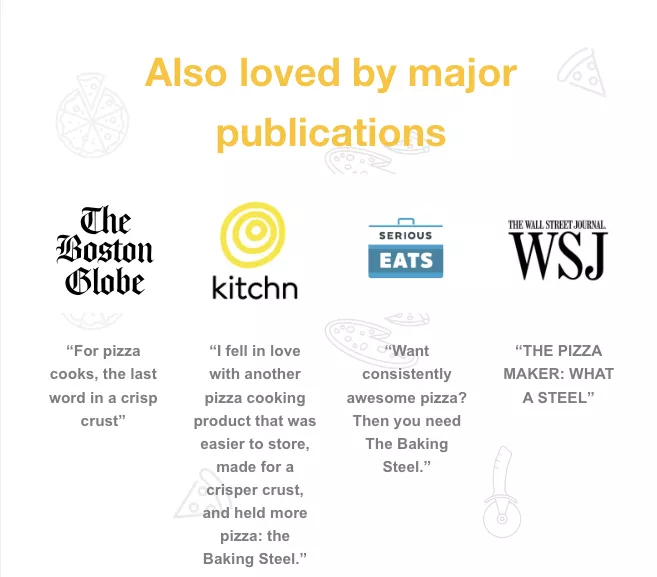
Pro Tip: Baking Steel’s strategic use of emails and signup forms has yielded impressive results, including a 214% increase in revenue per email for post-purchase campaigns.
3. To’ak Chocolate — Intelligent Integration of Trustpilot Reviews in Cart Recovery Emails
Type: Text (quotes)
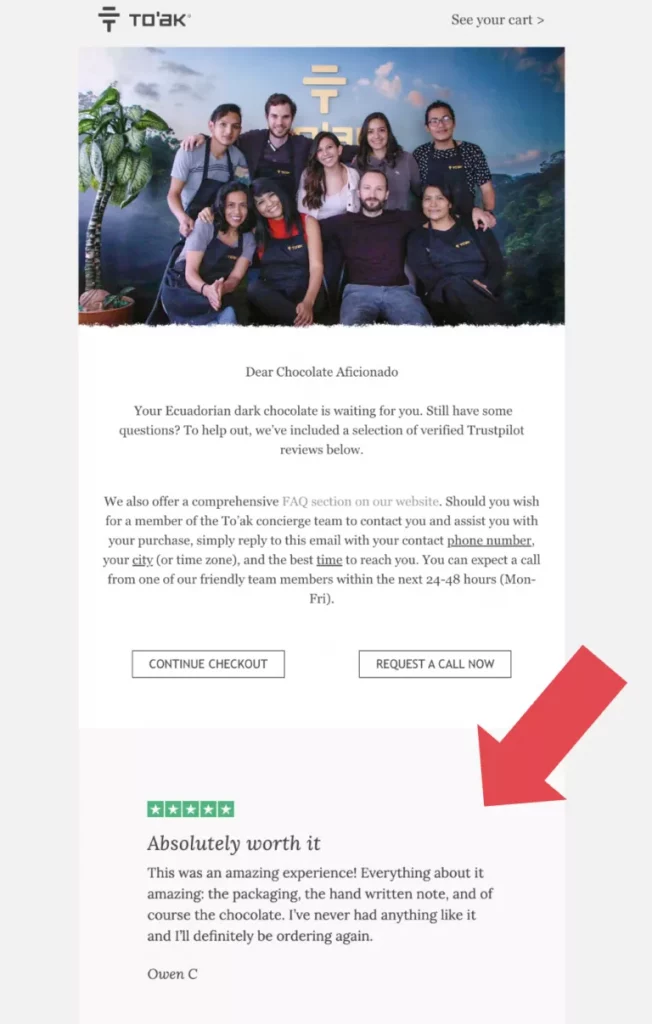
To’ak Chocolate, a premium chocolate brand, tackles the challenge of abandoned carts by incorporating Trustpilot reviews into their cart recovery emails. This approach provides social proof that reassures potential customers about the product’s quality and enhances their shopping experience.
Examining one such review in a cart recovery email, it emphasizes aspects such as packaging, personalized hand-written notes, and the chocolate’s quality. This customized touch is a persuasive element to encourage customers to complete their purchase, even when dealing with a higher price point.
Pro Tip: To comprehensively understand To’ak Chocolate’s email marketing strategy, delve into their complete case study.
4. Dollar Shave Club — Spotlighting Loyalty through Visual Content on Instagram
Type: Image
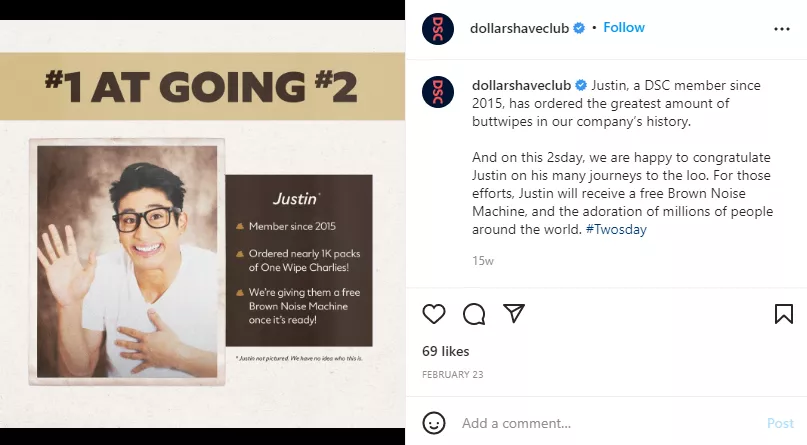
Dollar Shave Club takes a different approach on Instagram by featuring visual content showcasing the loyalty of one of its customers, Justin. While Justin might have yet to write a formal review, the post emphasizes and promotes his loyalty, a valuable aspect of brand promotion.
Part of their #Twosday campaign, where they share content related to grooming every Tuesday, this post doesn’t just sell a product; it builds a narrative around customer loyalty, potentially inspiring others to join the club.
5. See Kai Run — Leveraging User-Generated Content for Brand Engagement on Instagram
Type: User-generated content

See Kai Run, a prominent footwear brand specializing in children’s shoes, has adopted a dynamic approach to brand promotion through Instagram. The brand regularly features images of young customers wearing their sneakers, tapping into the authenticity and relatability of user-generated content. An illustrative post showcases a child sporting the brand’s sneakers, complete with a thoughtful tag to the child’s mother. This strategy fosters a sense of community and effectively utilizes the power of user-generated content to engage and connect with its audience.
Pro Tip: Incorporating diverse visual elements alongside customer images can enhance the appeal and shareability of your posts.
6. Sephora — Cultivating a Beauty Community Through Text Testimonials
Type: Text (quotes)
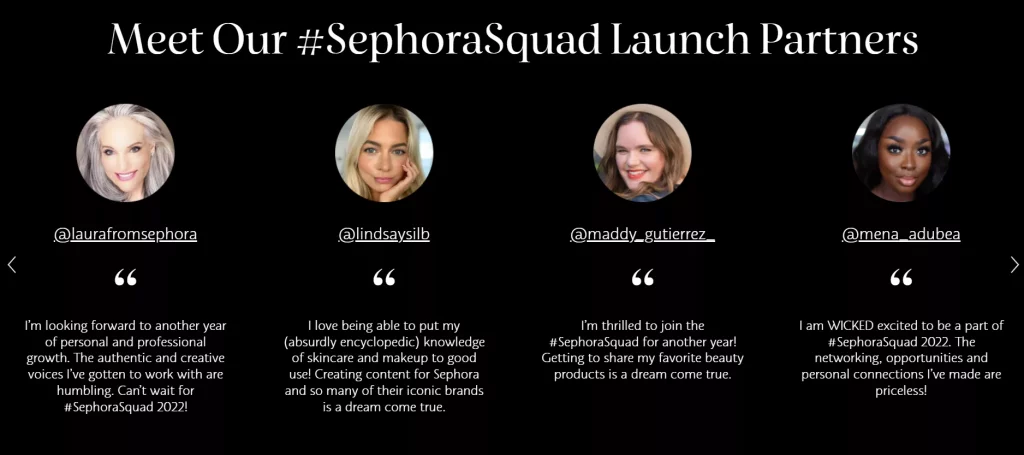
Sephora, a leading beauty brand, goes beyond conventional marketing by establishing the Sephora Squad, a community comprising storytellers, beauty enthusiasts, and artists. Sephora strategically showcases text testimonials from existing squad members on its website to attract new members. These testimonials feature quotes that provide insights into current members’ genuine experiences and positive sentiments, serving as a powerful tool for recruitment.
Pro Tip: Leveraging text testimonials in this manner can be an effective technique for enticing potential community members by highlighting the authentic voices within the existing community.
7. Amundsen Sports — Strategic Integration of Text Customer Testimonials on Website
Type: Text
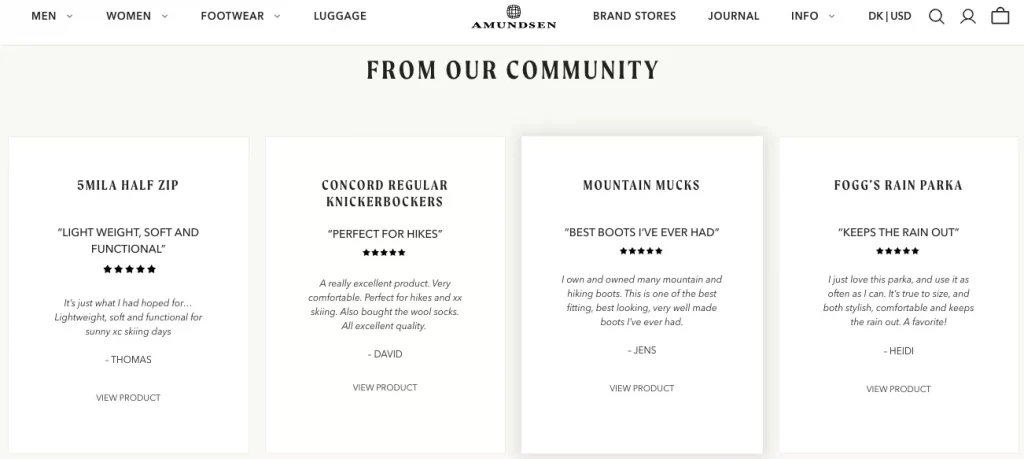
Amundsen Sports, renowned for its outdoor and adventure gear, strategically incorporates customer reviews on its homepage. These authentic testimonials serve not only as trust-building elements but also highlight the unique advantages of their products. The seamless linkage of each review to the relevant product enhances the overall user experience, guiding visitors from the homepage to specific product interests.
Pro Tip: The success story of Amundsen Sports, achieving a 57% conversion rate on abandoned cart emails, showcases the effectiveness of its review marketing strategy in driving sales.
8. Patagonia — Establishing Emotional Connections Through Personal Customer Narratives
Type: Text (quotes)
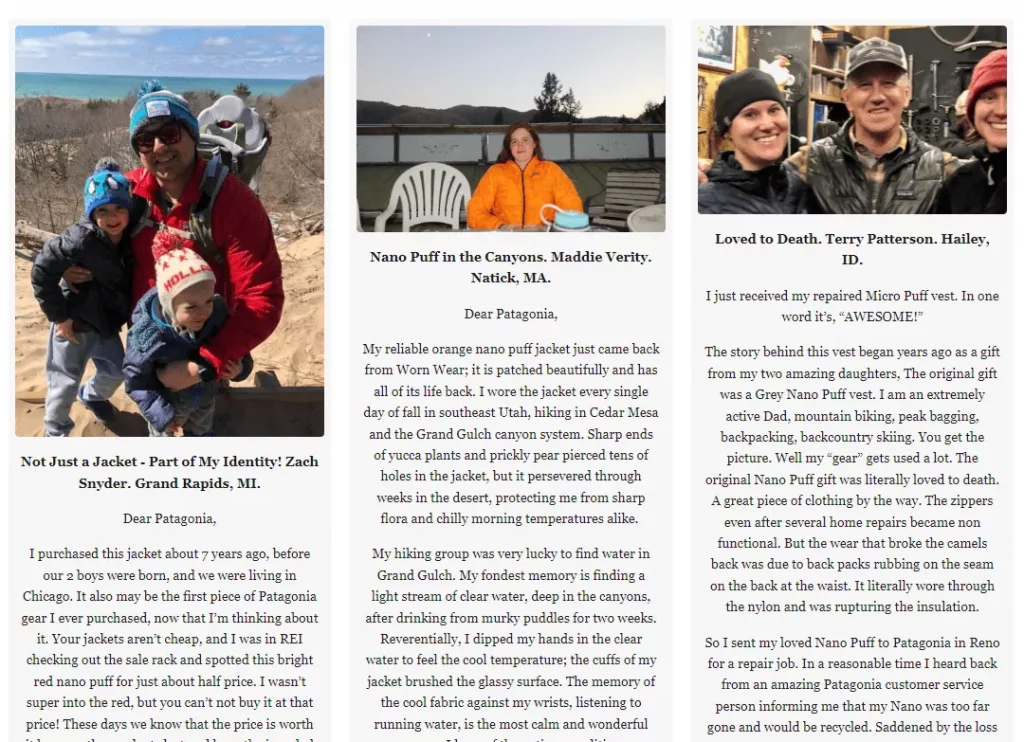
Patagonia, known for its commitment to sustainability, features a unique program called Worn Wear. To connect with customers personally, Patagonia includes a section on its website titled “The Stories We Wear.” This section encourages customers to share personal narratives about their Patagonia purchases, offering deeply emotional insights into what motivates customers to choose the brand’s products and services.
Pro Tip: Converting text testimonials into various formats, such as images, audio, or video, can further amplify the emotional impact and reach of these narratives.
9. Slack — Crafting Engaging Narratives Through Candid Conversations in a YouTube Video
Type: Video
Slack, a leading collaboration platform, has crafted a compelling testimonial commercial featuring Sandwich Video. This video is a testament to storytelling’s power in driving the message home. Narrating the transformation in the Sandwich Video team’s work dynamics after adopting Slack, the video incorporates humor and individual interviews, adding credibility to the testimonial. With over 1.29 million views, the video underscores the impact of a well-crafted testimonial narrative.
10. Monday.com — Elevating Testimonial Advertising with Loyal Client Reviews in a YouTube Video
Type: Video
Monday.com, a versatile project management platform, takes testimonial advertising to new heights by creating impactful testimonial ads. By inviting loyal clients for a 3-day storytelling experience, the brand collects compelling testimonials about how organizations benefit from Monday.com. These testimonials are then shared through YouTube, leveraging the video platform to promote the platform and drive leads and conversions. The approach emphasizes the importance of client narratives in showcasing the real-world impact of the product or service.
11. Google Ads — Showcasing Customer Success through Engaging Video Testimonials
Type: Video
Google UK provides a stellar example of utilizing video testimonial advertising through Google Ads to spotlight the success of one of its clients, Chuckling Goat. In a concise 100-second YouTube video, Chuckling Goat owners share their journey, attributing a remarkable 6,000% growth in sales over four years to the strategic use of Google Ads. This testimonial emphasizes the advertising platform’s effectiveness and highlights the transformative impact it had on the featured business.
Pro Tip: Elevate your video testimonials by incorporating storytelling elements, creative scripts, graphics, and other engaging elements to captivate your audience.
12. Daniel Wellington — Harnessing the Power of Influencer Marketing on Instagram
Type: User-generated content

Daniel Wellington, a renowned watch brand, leverages user-generated content, including that of influencers, on its Instagram account. Daniel Wellington has cultivated a significant following of over 4.8 million on the platform by regularly featuring posts from satisfied customers and influencers. The brand actively encourages content co-creation by prompting followers to tag them using #danielwellington, fostering a sense of community and engagement.
13. WeWork — Amplifying Brand Loyalty Through User-generated Instagram Testimonials
Type: User-generated content

WeWork, a leading coworking space provider, strategically showcases testimonials from satisfied customers on its Instagram profile. These testimonials, often presented as quotes from business owners, reinforce positive experiences with WeWork. The brand also embraces user-generated content, featuring customer posts showcasing their workspace experiences. This multifaceted approach on Instagram builds a narrative of brand loyalty and satisfaction.
14. Airbnb — Crafting Compelling Narratives Through Instagram Testimonial Advertising
Type: User-generated content

Airbnb relies extensively on user-generated content for testimonial advertising on Instagram. The brand features images and videos shared by customers, accompanied by snippets detailing their unique experiences. This form of advertising serves to not only showcase customer testimonials but also directs viewers to explore the properties mentioned. The example provided includes a personalized tip from a customer, adding a customized touch to the promotional content.
Conclusion:
Testimonial advertising is a potent tool for establishing trust, credibility, and engagement with your audience. The showcased examples highlight innovative approaches employed by diverse brands, ranging from Google and Daniel Wellington to WeWork and Aerie, to leverage customer testimonials effectively.
From compelling video narratives and influencer collaborations to user-generated content on social media, these testimonials contribute to brand growth, community building, and fostering a positive brand image. Incorporating storytelling, creative elements, and a mix of testimonial types, these strategies resonate with audiences, instilling confidence and encouraging brand advocacy.
As you embark on your testimonial advertising journey, consider tailoring your approach to align with your brand identity, audience preferences, and the specific platforms you engage with. Incentivizing user-generated content, promoting community interaction, and adopting a multi-channel strategy can amplify the impact of your testimonial campaigns.
FAQs on Testimonial Marketing:
How can I incentivize customers for user-generated content?
Offer incentives such as free products, exclusive discounts, or a chance to be featured on your platforms to motivate customers to generate content for your brand.
How does testimonial advertising contribute to community building?
Testimonial advertising fosters a sense of community by showcasing real experiences and creating a space for customers to connect over shared brand appreciation.
Can I automate the testimonial collection process?
Yes, platforms like Omnisend offer automation features, allowing you to collect and utilize customer testimonials systematically, streamlining the entire process.



